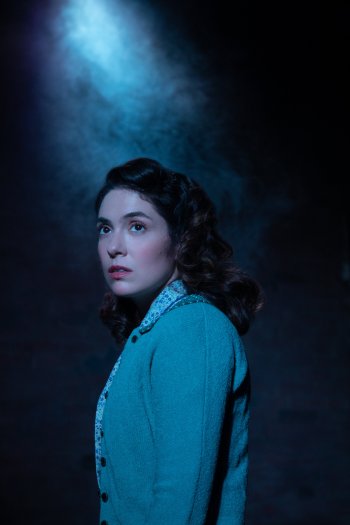A Will to Live
Helena Weinrauch’s haunting memoir of survival in three concentration camps is brought to life by a touching and respectful adaptation by Kirk Gostkowski.

Masha King in Helena Weinrauch’s “A Will to Live” adapted by Kirk Gostkowski at the Chain Theatre (Photo credit: David Zayas Jr.)
[avatar user=”Tony Marinelli” size=”96″ align=”left”] Tony Marinelli, Critic[/avatar]
As we approach almost 80 years after the end of World War II, which is recognized as the unconditional surrender of the Axis powers, there are still some factions that are in complete denial there ever was a Holocaust. Perhaps their math skills aren’t what they should be, but still we should examine some important numbers. The Nazis killed approximately 12 million people, of which at least six million were Jews. Of those six million, 1.2 million were children. A Will to Live looks at the story of a woman, from the ages of 16 to 21, from the moment Hitler invaded Poland to the moment the British soldiers rescued the comparatively few survivors in Bergen-Belsen.
If Helena Weinrauch was closer to her older sister’s age, we would not have this play. When Hitler invaded Poland, Helena stayed in town with less affluent relatives to continue with her studies while her parents and older sister left for the country to keep a lower profile. When war breaks out between Russia and Germany, there is no more school for Jews, no shopping, imposed curfews, zoning and the wearing of Star of David armbands. One day while she is at work, she is aware of a commotion outside. It is an Aktion – Jews are being rounded up for deportation. After hours pass, she runs to her house to find that her family has been taken away. She never sees them again.
It is important to remember that Weinrauch first wrote this as a memoir immediately after the war, entirely in the first person. It was translated into English when she came to New York in 1949. The adaptor, Kirk Gostkowski, the artistic director of Chain Theatre, keeps the play as faithful to the original as possible. He is quoted as saying that as Weinrauch wrote her tale in the first person, he did very little in shaping the emotional journey. As a play, it very much wrote itself.

Masha King in Helena Weinrauch’s “A Will to Live” adapted by Kirk Gostkowski at the Chain Theatre (Photo credit: David Zayas Jr.)
When we first meet Helena, it is 1945; she is recovering now in a Swedish hospital from the most inhumane imprisonment at Bergen-Belsen. She arrives there weighing only 66 pounds. It is so often said, “What doesn’t kill you, makes you stronger.” As brutal as her first concentration camp in Plaszow is, it is a country club by Bergen-Belsen standards. Forced labor, regular beatings and endless humiliation and starvation are the day in, day out for her. By the time she reaches Auschwitz she is almost incapable of connecting emotionally to her fellow prisoners.
Director Rick Hamilton effectively steers the sad tale away from an endless maudlin saga. After all, the “spoiler” is in the program. Helena Weinrauch is alive and well and in her late 90’s, living in New York City. She attended the opening night of this production. We are carried by Helena’s travails – some are ultimately uplifting, like her about-face on her relationship with Wladek, a Jewish guard. She takes him to task for his participation in the black market, but he steps in to save her from death more than once. Earlier, she leaves the safe haven of living with a German couple who think Helena is married to a German officer on the front so not to put them in harm’s way when she knows she will ultimately be found out to be a Jew masquerading as a young German bride. Hamilton is conscious of needing every scene to be driven by intense depictions of rapid change in what was once a beautiful place to live.
Masha King, in the role of Helena, is a stunningly gifted actress who brings pathos to a heartbreaking life on stage. As the very young Helena, she is a vibrant teen-age girl with the world and her life ahead of her. Her transition into a woman aged by war and desperation is frightening to watch in such a small space. We are right there with her as she gasps watching an SS soldier shoot an old Jewish man in the street. Not to reveal her identity she blames her reaction on the sight of blood…any blood.

Masha King in Helena Weinrauch’s “A Will to Live” adapted by Kirk Gostkowski at the Chain Theatre (Photo credit: David Zayas Jr.)
David Henderson’s set and projection design is on point throughout the play. Some of the projections focus on the cracks in walls and the articulation of some of the close-up metal work, as in the “Arbeit macht frei” sign at Auschwitz. Barracks are appropriately dreary and grey. We are very much aware of the hideous changes in locale. Michael Abrams’ lighting is sensitive to Helena’s waking moments and the disparities of one locale being followed by an even more frightening and bleak one. Debbi Hobson’s costumes effectively demonstrate the vast difference between living well and later, the wearing of rags. Greg Russ’ sound design succeeds in creating an environment where the sound of a gunshot to kill someone hangs in the air long enough to put us right there.
For those who don’t really understand the horrors that were the holocaust, plays like this are an effective reminder. Ironically, two plays with this same message from Off-Broadway last season are transferring to Broadway this year. Barry Manilow’s Harmony, detailing the story of a 1930s German male singing group composed of Jews and non-Jews, and Joshua Harmon’s Prayer for the French Republic, following generations of a Jewish family from war-torn France to the present day. Later this month, in an effort to educate the younger people today who can’t fathom a systematic annihilation of six million Jews, the Paley Center for Media’s series that looks at media’s role in combating anti-Semitism examines the use of current technology, including gaming and Artificial Intelligence, to keep the stories of the Holocaust survivors alive and relevant for the future generations.
We are graced with an epilogue of the real Helena Weinrauch in recent conversation. It is absolutely amazing that she now devotes herself to spreading an intense desire for peace, especially for younger people. She wishes for the concept of hate to disappear from everyone’s lives and vocabularies. She is a woman of pure indomitable spirit and an inspiration in so many ways.
A Will to Live (through September 16, 2023)
Chain Theatre, 312 West 36th Street, 3rd floor, in Manhattan
For tickets, visit http://www.chaintheatre.eventive.org/
Running time: two hours and 30 minutes including one intermission






Leave a comment